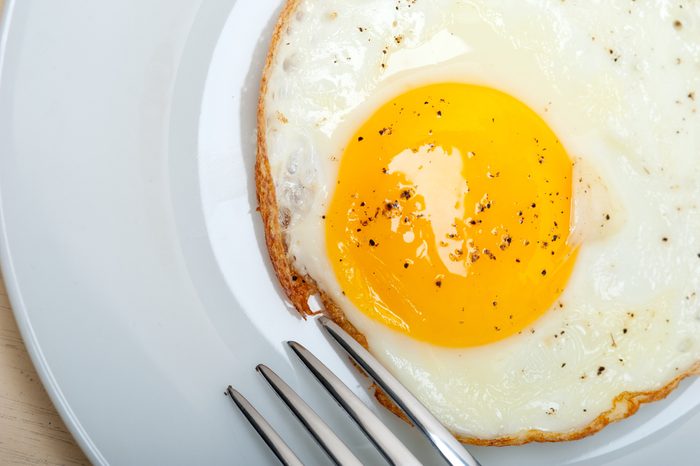Here’s How Much Vitamin D Is in One Egg, with a Nutritionist’s Wisdom
Updated: May 11, 2023

There's a savory source of that sunshine vitamin right on your breakfast plate!
Our editors and experts handpick every product we feature. We may earn a commission from your purchases.
When someone says they’re off to get some vitamin D, they usually mean spending a little bit of time out in the sun (or maybe going to grab a vitamin D supplement). But what if that phrase was actually referring to going to cook up an egg?
Eggs are one of your best sources—as well as one of the few foods—that are rich in vitamin D (here’s a list of other vitamin D-rich foods). So, how much vitamin D is in an egg? According to the USDA, one large egg contains around 11% of your daily value (DV). This means that if you like to scramble up two eggs for breakfast, that’s 22% of your vitamin D needs for the day from one meal.
While the sun is a major source of vitamin D, for those who aren’t able to get enough sunlight during the day, experts suggest having dietary sources of vitamin D is key for your health and well-being.
I Ate Eggs Every Day for a Week—Here’s What Happened
Eat the whole egg for vitamin D
If you’re cracking into an egg for vitamin D, don’t toss the yolk! While it might seem healthier to eat just the egg whites, that egg yolk is full of all kinds of nutrients your body needs—like protein and, yes, vitamin D. Says Lauren Manaker MS, RDN, LD, a partner with Vital Farms: “The yolk houses this important nutrient, so if a person is focused on increasing their intake of this vitamin, they need to eat this part of the egg.” Without the egg yolk, you lose a lot of that vitamin D goodness from your snack or meal.
The Healthy @Reader’s Digest’s Medical Review Board co-chair Latoya Julce RN, BSN notes that though egg yolks are rich in cholesterol, “it should be fine for most people, especially if the individuals have an active lifestyle. As a trainer, eggs play a huge role in my diet and I never take out the yolk.”
So how does an egg contain such substantial vitamin D? Turns out, it has to do with the amount of sunlight exposure the chicken who laid it received. Manaker explains: “Like humans, chickens can produce more vitamin D if they are exposed to more sunlight. The resulting egg can contain more vitamin D, versus eggs that come from chickens that are not exposed to the sunlight for extended periods of time.”
There’s one more reason to shop for cage-free eggs—better yet if the label reads “free-range,” most likely meaning the chicken had the freedom to roam outside in daylight.
Why it’s important to get enough vitamin D
Along with giving your mental health and emotional well-being a much-needed boost, vitamin D is also essential for your physical health. Vitamin D helps to regulate calcium and phosphate in the body, which is important for teeth and bone health. One 2020 study in the peer-reviewed scientific journal Nutrients suggested sufficient vitamin D was associated with a reduced risk of sports-related injuries.
Manaker points out that most Americans are deficient in this essential nutrient. “So enjoying egg yolks can help people meet their needs,” she says.
Can You Get Vitamin D Through a Window? Doctors Explain
Tasty ways to add eggs to your diet
Is it unhealthy to eat eggs every day? Contrary to popular belief, eggs can actually be a great addition to a heart-healthy diet as well as a great source of vitamin D. (Read how many eggs one cardiologist suggested are safe to eat in a week.)
Adds Manager: “The American Heart Association advisory recommends that, for healthy individuals, consuming an egg a day is acceptable in a heart-healthy dietary pattern. They add that, given the nutritional benefits and convenience of eggs, consuming up to two eggs per day is acceptable within a heart-healthy dietary pattern for older adults.” And remember: That two-egg scramble can equate almost a quarter of your vitamin D value for the ay.
If you’re looking to add more eggs to your diet and get that vitamin D boost, Manaker recommends a few meals that make getting the sunshine vitamin a breeze:
- Start the day with an egg sandwich made with whole-grain bread and avocado
- Top a fried egg on your burger
- Enjoy an egg salad sandwich for lunch
- Whip up a classic Shakshuka for dinner
- Scramble eggs into your fried rice for an extra protein (and vitamin D!) boost—Here’s How Much Protein You Really Need in a Day, with a Kidney Doctor’s Wisdom
- Snack on pre-peeled, pre-cooked boiled eggs
- Experts Say Most People Who Live to 100 Years Old Share This One Thing in Common
- How to Stop Allergies Immediately, According to Allergy & Immunology Doctors
- This Beloved Superfruit Was Just Named One of the “Dirtiest” Groceries
- Olympic Runner Gabby Thomas Shares Her Self-Care Secrets You Can Follow—Even If You’re Not an Athlete
















